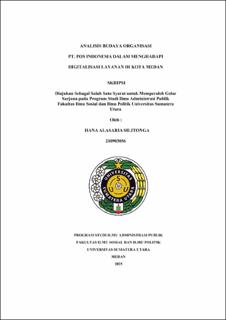Analisis Budaya Organisasi Pt. Pos Indonesia Dalam Menghadapi Digitalisasi Layanan Di Kota Medan
Organizational Culture Analysis of PT. Pos Indonesia in Facing Service Digitalization in Medan

Date
2025Author
Silitonga, Hana Alasaria
Advisor(s)
Saraan, Muhammad Imanuddin Kandias
Metadata
Show full item recordAbstract
This study aims to analyze the organizational culture implemented by PT.
Pos Indonesia in facing the challenges of service digitalization, particularly at the
Main Branch Office (KCU) in Medan City. In the rapidly evolving digital era,
public organizations such as PT. Pos Indonesia are required to undergo
transformation not only in their service systems but also in their values and work
culture. This research employs a descriptive qualitative approach, using in-depth
interviews with five informants from diverse backgrounds: the finance and
general administration manager, the operational manager, the courier and
logistics control manager, the front-office staff, and a member of the public as a
service user.
The data were analyzed using the seven organizational culture indicators by
Stephen P. Robbins, which include innovation and risk-taking, attention to detail,
outcome orientation, people orientation, team orientation, aggressiveness, and
stability. The findings reveal that PT. Pos Indonesia’s organizational culture remains
largely bureaucratic and is not yet fully responsive to digital change due to
limitations in human resource capacity and financial constraints. Innovation and
risk-taking are still limited, attention to service detail is inconsistent, and outcome
orientation is often hindered by rigid work systems. Although efforts to strengthen
teamwork and foster human-centric public service are evident, the main
challenges lie in technological adaptability and under-optimized human resource
roles.
Therefore, a reform of the organizational culture is needed—one that is not
only flexible and dynamic but also aligned with technological advancements and
market demands. This effort can be carried out through capacity building of
human resources, streamlining bureaucratic procedures, and strengthening
managerial commitment to support innovation. The transformation of
organizational culture must become an integral part of the digital adaptation
strategy, enabling Pos Indonesia to become more responsive, competitive, and
relevant within the modern public service ecosystem.
Collections
- Undergraduate Theses [1957]
